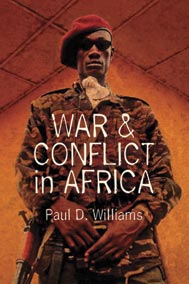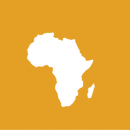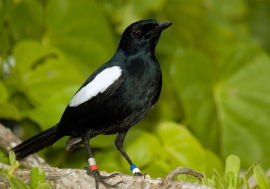Africa Books
they must be obtained directly from the publishers **
Book review
War and Conflict in Africa
by Paul D. Williams (Polity Press, Cambridge, UK, 2011; 320 pp; $24.95)

Even as more of Africa’s wars wind down, the question of why so many broke out on the continent still yields few clear answers. Yet a better understanding of what triggered those wars may help preserve fragile peace agreements, resolve the wars that still fester — and even prevent new outbreaks of mass bloodshed. War and Conflict in Africa gives a comprehensive — if somewhat dry and academic — overview of the broad patterns of warfare in Africa, and highlights a few possible lessons for achieving peace.
Paul Williams avoids the pitfall of trying to identify a single, sweeping explanation. In a detailed study of scores of wars and other violent conflicts in more than two dozen countries from 1990 to 2009, he finds that the reasons for war in Africa have been as complex as anywhere else in the world. The most common “big ideas” — that African wars are a heritage of colonialism, are instigated solely by elites, are driven by ethnicity or are caused by greedy criminals — do not hold up on inspection, Williams argues. Those elements may well be present, he admits, but by themselves explain little, since they are also at play in most African countries that have not had wars. Williams does detect a common thread in countries where war broke out: they had weak states that were dominated by personalized networks of political patronage, and when those states responded to new challenges with violence, they were unable to contain the violent counter-reactions that resulted.
International — and increasingly African — peacemakers and peacekeepers have succeeded in patching together a number of tenuous peace accords, Williams acknowledges. But all too often those efforts have paid scant attention to the local causes of conflict and have relied too heavily on cobbling together elite power-sharing arrangements. “The top-down peacemaking of elite bargains will not offer any quick fixes to Africa’s wars,” he warns. Instead, deep-going reforms are needed, especially of Africa’s security forces, and far more resources must be provided both for peace efforts and for post-war development programmes.
— Ernest Harsch
Winner Take All: China’s Race for Resources and What It Means for the World by Dambisa Moyo (Basic Books, New York, NY, USA, 2012; 272 pp; pb $26.99)
Sudan, South Sudan, and Darfur: What Everyone Needs to Know by Andrew S. Natsios (Oxford University Press, New York, NY, USA, 2012; 280 pp; pb $16.95)
Conflits identitaires en Afrique francophone by Pape Marc Adoux (L’Harmattan, Paris, France, 2011; 216 pp; pb €20.50, e-book €18.45)
Rethinking Development in Africa by Munyaradzi Mawere (Langaa RPCIG, Bamenda, Cameroon, 2011; 229 pp; pb £18.95)
The Trouble with the Congo: Local Violence and the Failure of International Peacekeeping by Séverine Autesserre (Cambridge University Press, Cambridge, UK, 2010; 311 pp; pb $28.99)
Dancing in the Glory of Monsters: The Collapse of the Congo and the Great War of Africa by Jason Stearns (PublicAffairs, New York, NY, USA, 2012; 416 pp; pb $16.99)
Afrique au fil de la démocratisation du développement et de la mondialisation by Yao Assogba (L’Harmattan, Paris, France, 2012; 206 pp; pb €19, e-book €15)
The Last Hunger Season: A Year in an African Farm Community on the Brink of Change by Roger Thurow (PublicAffairs, New York, NY, USA, 2012; 304 pp; pb $26.99)
The Journey to Tahrir: Revolution, Protest and Social Change in Egypt, eds. Jeannie Sowers and Chris Toensig (Verso Books, London, UK, 2012; 310 pp; pb $29.95, £19.95)
L’Egypte en marche, eds. Christian Lochon and Jean-Jacques Luthi (L’Harmattan, Paris, France, 2012; 232 pp; pb €22.30, PDF €18)
Race Troubles: Race, Identity and Inequality in Post-Apartheid South Africa by Kevin Durrheim (Lexington Books, MD, US, 2011; 248 pp; hb $70)
Comment l’Afrique en est arrivée là by Axelle Kabou (L’Harmattan, Paris, France, 2011; 426 pp; pb €35)
Effectiveness of Aid for Trade in Small and Vulnerable Economies: An Empirical Assessment by Dirk Willem te Velde, Massimiliano Calì and Mohammad A. Razzaque (Commonwealth Secretariat, London, UK, 2011; 90 pp; pb £15.00, e-book £12.00)
Madagascar dans une crise interminable by Toavina Ralambomahay (L’Harmattan, Paris, France, 2011; 138 pp; pb €13.50)
La place et le rôle des femmes dans la société congolaise: 1960-2010 by Jeanne Dambendzet, Scholastique Dianzinga and Elise Thérèse Gamassa (L’Harmattan, Paris, France, 2011; Vol. 1: 236 pp; pb €24; Vol 2: 276 pp; pb €27)
Sud-Soudan, conquérir l’indépendance, négocier l’Etat by David Ambrosetti (Karthala, Paris, France, 2011; 232 pp; pb €19)
Au Cameroun de Paul Biya by Fanny Pigeaud (Karthala, Paris, France, 2001; 276 pp; pb €24)
Indépendances africaines: chroniques d’une relation, ed. Olivier Barlet (L’Harmattan, Paris, France, 2011; 248 pp; pb €22, e-book €16.50)
Chroniques afro-sarcastiques. 50 ans d’indépendance, tu parles! by Venance Konan (Favre, Lausanne, France, 2011; 152 pp; pb €18)
Côte d’Ivoire : La réinvention de soi dans la violence, ed. Francis Akindès (Codesria, Dakar, Senegal, 2011; 272 pp; pb £24.95)


















